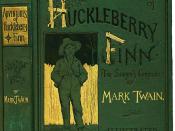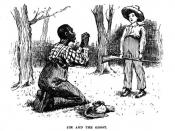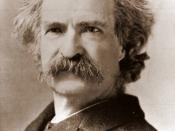Samuel Clemens, better known as Mark Twain, encapsulated an era in his literary works. Utilizing his characteristic dry wit and firm grasp of humanity's foibles, Twain masterfully handles the novel The Adventures of Huckleberry Finn. Huckleberry Finn explores the major societal issues of the late nineteenth century, from the stratification of classes to contemporary ethics. F. Scott Fitzgerald, the premier writer of the twentieth century's Roaring Twenties, also focused his writing on society. His highly acclaimed novel, The Great Gatsby, explores the social climate of the 1920's, commenting on the same issues Twain documented in Huckleberry Finn, updated and refurnished for a modern generation.
The Adventures of Huckleberry Finn is best known as a social commentary--Clemens's sardonic view of society guised as an innocent adventure novel. Through careful observation Twain gained insight into the heart of humanity and then regurgitated this knowledge into a wry attack on the immorality he saw in society.
That society was intrinsically wrong, Twain had little doubt. Atrocities were committed every day, and not just by the 'white trash' of the South (Branders 331). The well-to-do Grangerfords and Shepherdsons, the 'respectable' Sherburn, and the powerful middle class all have sullied pasts. Huckleberry Finn also focuses on the indifferent attitude the citizens have toward their crooked deeds, not just the deeds themselves. As Smith so succinctly states, "The dominant culture is decadent and perverted. Traditional values have gone to seed. The inhabitants can hardly be said to live a conscious life of their own" (366). In one town Huck alights upon, a self-righteous man, Colonel Sherburn, murders the town drunk. The outraged village swarms Sherburn's home, threatening to lynch him. Instead of begging forgiveness, Sherburn attacks the cowardice of the crowd, laughs at their bravado, and unconsciously exposes his own moral disintegration:...


